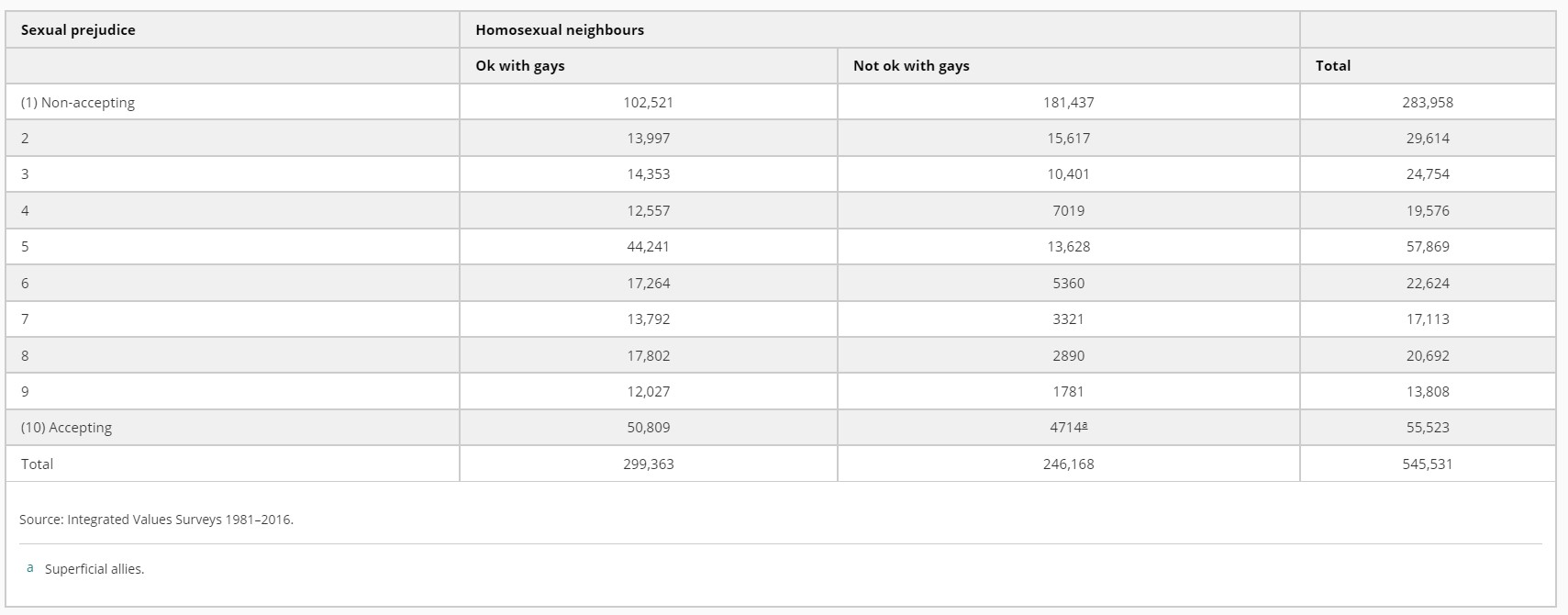In San Francisco, nearly 80 percent of residents say they want to help the homeless but routinely hire private security to patrol their own neighborhoods - to keep out the homeless.
Sexual minorities would seem to be exempt from all of that, the only place you see nearly all heterosexual white couples in advertising these days is a Whole Foods commercial, everyone else wants to make sure they check off inclusion boxes, and I applaud that; not because I am some super social justice warrior but because if I am running a business and my customer pool can be 10 people or 6, I am wanting 10 every time.
I have no evidence any sexual minority is more inclined to believe anti-science nonsense about food, but no evidence they are less inclined either, but if they are not a larger part of marketing efforts it may be similar reasons in a new paper that looks at “superficial allies” - people who say they fully support sexual minorities but then get NIMBY about having sexual minorities live next door.

Whole Foods; the official grocery story of rich, white, anti-science people.
Yet one thing we know about surveys is that answers are cheap. Behavior is all that counts. When California led the world in vaccine denial it wasn't showing up on surveys, but it was in CDC data. On surveys they did not admit they were anti-vaccine, they were instead likely saying they supported them but were for body autonomy or said vaccines 'needed more study' and all the other lingo that gets trotted out. While in behavior some schools on the coast of the state had vaccination rates around 25 percent.
It is worrisome for the rights of minorities because even avid LGBTQ supporters say they don't want them as neighbors. That almost certainly translates to behavior. Worse, since many people answer questions on surveys as they would if their friends are watching, the people who claim to support those communities but really don't may be even higher.

CLICK FOR FULL SIZE.
The work itself is a big flip because most sociology papers want to dump on people they don't like - this instead examined people who said all of the right things in most cases. Author and sociologost Dr. Shahin Davoudpour of Northwestern University wrote, “Everything we know from research is about the stigmatizing group. For example, in popular news, the rhetoric focuses on homophobic parents who become allies upon discovering their child is gay. What we don’t ever hear about is the opposite of this: You’re supportive of them, but once they come out, then you no longer want to be neighbors, colleagues or even friends."
He drew his conclusion using 545,531 survey respondents from 113 countries in what is deemed the Integrated Values Surveys which was itself created using 1981–2016 data from the World Value Survey, the European Value Study, and Social Acceptance of LGBT People in 141 Countries project.
"Prejudice" was self-selected on a scale of 4, from 'never justified' homosexuality to 'always justified' and then matched to other data from answers to who someone does not want to live near, and one possible answer was homosexuals. While 55,523 respondents who rated themselves as “fully accepting”), 4,714 of those said they did not want a homosexual neighbor. Something doesn't add up there. Do they not want to have a home nearby with a better color scheme? More corgis being cute on morning walks? I joke obviously, but almost 9 percent is a big number that has no other explanation than NIMBY-ism.
Yet the chart is even more worrisome because only the group putting a hard stop on a gay neighbor is labeled a superficial ally, whereas everything except the 347,000 in the non-accepting columns is alarming. Of the about 154,000 out of ~299,000 who want gay people to have equality, about 31,000 don't really want gay people living near them; that's 20 percent false flag supporters.
Dr. Davoudpour says this means greater need for legal protection and may have a point; when surveys are lying about the real world, including masking those who claim to be LGBTQ supporters, it may be time to get government more involved.





Comments